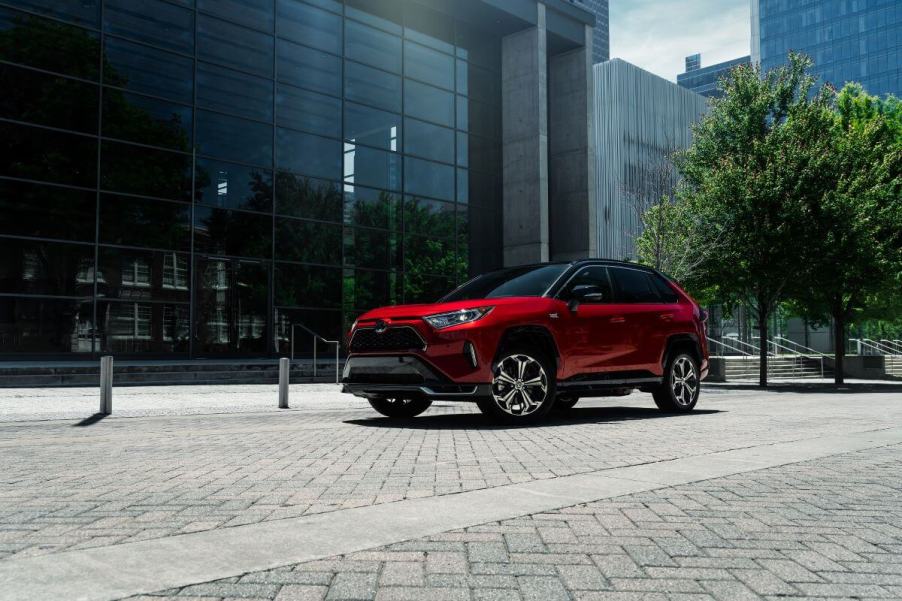
Every Toyota EV and Hybrid: Your Guide to the Electrified 2023 Lineup
Toyota is planning a factory floor overhaul as it maps out a move to a new dedicated platform for battery electric vehicles. As the world’s biggest automaker, Toyota recognizes the need to match competitors like Tesla in producing EVs to a higher margin. Critics argue that Toyota should push hard into battery-electric vehicles to compete with other global rivals and provide cost-saving EVs. Currently, the manufacturer has only 15 electrified vehicle models.
Toyota’s 15 current electrified models
According to Reuters, more than half of vehicle production by 2030 will be EVs. Meeting that demand requires Toyota to restrategize its electric vehicle lineup. In the U.S., where EV growth is outpacing the overall market, Toyota’s lack of electric models is hurting the company’s sales. Toyota reports that its U.S. sales fell nearly 9% during the first 2023 quarter. To mitigate the problem, the manufacturer currently offers 15 electrified models in four categories: hybrid, plug-in hybrid, fuel cell electric, and all-electric.
Hybrid cars start, refuel, and handle like the gas-only models but with better mpg ratings. Toyota reports its hybrid lineup has 11 models. The vehicles include; Corolla Cross Hybrid, Sequoia, Highlander Hybrid, Toyota Prius, Corolla Hybrid, Camry Hybrid, RAV4 Hybrid, Venza, Tundra i-FORCE Max, Sienna, and Toyota Crown.
On the other hand, plug-in hybrid electric vehicles (PHEVs) intelligently go between rechargeable battery power and conventional fueling systems to give owners the best of both worlds. Toyota only has two PHEVs; the Prius Prime and RAV4 Prime.
Another electrified model Toyota offers is the hydrogen fuel-cell Mirai. The car uses hydrogen to generate electric charges and only emits water vapor from the tailpipe. It is only available in California due to infrastructure issues regarding refueling stations.
The last electrified category drivers can get from Toyota is the all-electric bZ4X. The model only uses a battery to propel powerful electric motors that provide smooth, silent, and clean propulsion.
The RAV4 Hybrid is the highest-rated Toyota hybrid
According to MotorTrend, users gave the Toyota RAV4 Hybrid an overall score of 9.1 out of 10. At about $31,225, buyers get a 2.5-liter, four-cylinder engine with 219 hp and 163 lb-ft of torque. The hybrid component includes two electric motors and a reliable CVT.
Toyota says the RAV4 hybrid can sprint from 0-60 mph in just 7.1 seconds. That’s faster than its gas-only sibling, which takes 8 seconds.
The RAV4 Prime PHEV offers better performance

Toyota has only two PHEVs; the Prius Prime and the RAV4 Prime. Edmunds notes that the RAV4 Prime plug-in hybrid powertrain makes it the most efficient PHEV model from Toyota. Unlike the Prius Prime, which delivers 220 hp from a 2-liter engine setup, the RAV4 Prime provides 302 hp.
The manufacturer reports a 0-60 mph time of around 5.9 seconds, making the RAV4 Prime among the quickest Toyota models on the market.
The Mirai’s hydrogen power is a rare EV
The Mirai is the only fuel-cell electric vehicle Toyota offers and is one of only three hydrogen cars in the market. The Toyota Mirai delivers 182 hp and a driving range of 357 miles. Additionally, the vehicle is quiet since it’s electric and only requires 5 minutes to fill its hydrogen tank.
The bZ4X is the only all-electric model from Toyota
The Toyota bZ4X is the cornerstone of Toyota’s electric future. Starting at $42,000, buyers get a range of up to 252 miles per charge and 215 hp. According to the manufacturer, the vehicle has a solar roof that generates energy for about 1,120 miles per year.
While Toyota is the world’s top carmaker, experts note that the manufacturer has slowly shifted toward battery-powered vehicles. The slow adoption has allowed competitors like Tesla, Ford Motors, and General Motors to leave Toyota behind in the U.S. auto market. However, the recent change in the leadership team is looking to overhaul Toyota’s EV strategy.



